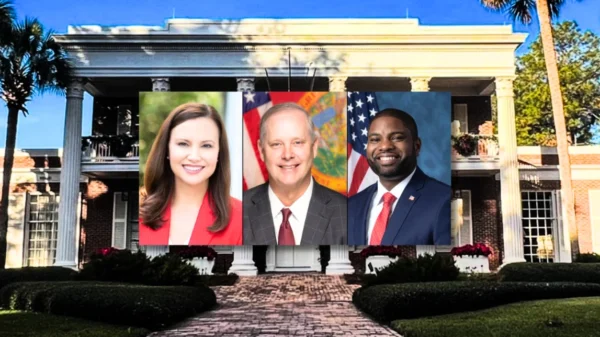On Tuesday, U.S. Rep. Byron Donalds, R-Fla., testified before the U.S. Senate Banking, Housing and Urban Affairs Committee’s Subcommittee on Economic Policy in a hearing on “The Student Debt Burden and Its Impact on Racial Justice, Borrowers, & The Economy.”
Donalds said the following:
Chairwoman Warren, Ranking Member Kennedy, thank you for inviting me to testify in front of the Committee on the important discussion surrounding student debt.
Let me begin with one word of absolute truth before delving more into the specifics of the issue at hand – and that is that nothing in this world is free. Someone is always paying. Even with charity: if a doctor sees a patient and decides not to charge them, then the doctor himself pays that debt through services provided without being compensated. Whatever his compensation would have been, that is how much he paid so that his patient wouldn’t have to. When our government doles out two trillion dollars in emergency spending, like we did last month, no matter how good or noble the cause may seem, it is either this generation or the next who must pay the tab. Money that this government spends does not disappear – it’s why right now, we are nearly thirty trillion dollars in debt; that means every U.S. taxpayer is responsible for $225 thousand dollars of public debt. Each time Washington spends money, it adds up, and there will come a day when the bill collector comes, and it won’t be pretty and may ultimately be the undoing of this republic if Congress is not more prudent in how it spends other people’s money.
On the topic of today’s hearing, Democrats in Congress and the President himself have made clear their desire to “cancel” student loan debt. This, while clearly a political ploy meant to keep Democrats in power by hoodwinking the American people into thinking their debt won’t impose a cost on society, will not solve the problem that all of us recognize needs fixing. I understand the convenient messaging of telling Americans that the money they owe can just disappear. But that’s not the case. If this policy moves forward, it will result in even higher tuition costs for students who plan to go to college in future years, with disastrous collateral damage elsewhere to the economy – including and especially to lower-income families and African-American communities.
Who should we suppose will pay the hundreds of billions of dollars that is currently owed? Do we force colleges to repay money given to them for the asset of a college degree, meaning that the thousands of teachers and professors in this country cannot get paid or will lose their jobs? Where would universities get the funds to pay them, if the students who fund their livelihoods in exchange for a degree so that they can go out and get a job don’t actually have to pay for the invaluable education they received from these teachers?
Or perhaps the “wealthiest among us” should, once again, be called upon to pay more. These are the very job creators who newly graduated college students will need to hire them and pay them so that they can survive on their own and become contributing members of their communities. If we start taking away from their pool of funds, that is not a solution to the problem.
Lastly, do we call upon those individuals who did not go to universities to pay for those who did? Ultimately, it is very likely that is what this Democrat proposal will do, forcing individuals at the lower end of the income spectrum (which trends black more than white) to pay to have privileged students get their liberal arts degree.
A study conducted just last year found that, under a universal loan forgiveness policy like the one that the President and Democrats in Congress have proposed, individuals at the top of the earnings decile would receive more than five times the loan forgiveness as an individual in the lowest income bracket. Furthermore, the study determined that “households in the top 30 percent of the earnings distribution receive almost half of all dollars forgiven.”
So you see Chairwoman Warren and Ranking Member Kennedy, loan forgiveness policies like those that have been discussed will actually be a regressive tax policy disproportionately benefitting the rich at the expense of the middle class and low-income workers, which as has been discussed here today trend black more than white. Let’s be honest with the American people when we talk about the Democrat loan forgiveness policy.
I am no stranger to student loan debt myself – in fact, at this very moment, I still have student loans I am paying back each month. And yet I wouldn’t be here today without my education from Florida A&M University and Florida State University, for which I am incredibly grateful for the opportunity I had to attend and learn. There is no question that my education was worth far more than what I am still paying back – and because I received that education, and I benefitted from that, it is my responsibility to pay for it.
But as we know, not everyone who attends college ends up with a degree that is worth the dollars spent attaining it. Time is too short to deliberate here today what type of educations are worth more than others, but it is time we look to ensure that public dollars spent on public education have a public return on investment. If it is my taxpayer dollars, and the taxpayer dollars of constituents in my district in Naples or Fort Myers or Cape Coral or elsewhere, going toward funding someone else’s education in California or New York or Minnesota, then there better be a return on our investment that is at least equal to what we paid into it. Maybe not directly to us in Florida, but for the benefit of our nation. That’s not to say that everyone shouldn’t be able to choose whatever field of study they desire – but if public dollars are involved, then there needs to be a correlation to a public good.
That said, the priority of this Congress and this Committee should be on controlling the ballooning costs and expenses of colleges and universities in our country. A 2017 study by the Federal Reserve Bank of New York found that, for every dollar of subsidized federal loans, tuition increased 60 cents.
If the ultimate goal is to increase the cost of going to college, the Democrat plan will do just that. Not only does “canceling” student debt fail to solve the problem, but it will also actually make the problem even worse by driving up tuition costs. This is irresponsible governing, and it is something we must all fight against.
Once again, I am grateful to be invited to participate in today’s hearing, and I encourage us all to look at the very real problem of the rising costs of tuition and seek to address this in a way that is not a short-term fix, but a real long-term solution. Thank you.



















